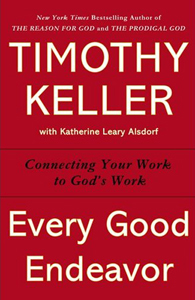 While others have written more scholarly defenses of the theology of vocation, Every Good Endeavor is the most accessible and helpful book I’ve ever read on integrating a Christian perspective with our daily work—-whether that work be “blue-collar” or “white-collar,” physical or mental, menial or high-profile. Moreover, Keller simultaneously (and winsomely) speaks to non-Christians who are trying to make sense of the frustrations and pleasures of their work lives.
While others have written more scholarly defenses of the theology of vocation, Every Good Endeavor is the most accessible and helpful book I’ve ever read on integrating a Christian perspective with our daily work—-whether that work be “blue-collar” or “white-collar,” physical or mental, menial or high-profile. Moreover, Keller simultaneously (and winsomely) speaks to non-Christians who are trying to make sense of the frustrations and pleasures of their work lives.
Keller begins with God’s plan for our work: The idea that work preceded the Fall, that work gives dignity to humankind, and that work allows us to cultivate the created order such that others are served. Keller also relates our vocation to the gospel doctrine of justification by faith alone:
First, if religious works were crucial to achieving a good standing with God, then there would always be a fundamental difference between those in church ministry and everyone else. But if religious work did absolutely nothing to earn favor with God, it could no longer be seen as superior to other forms of labor.
The gospel of salvation through sheer grace holds a second implication for work….many modern people seek a kind of salvation–self-esteem and self-worth–from career success. This leads us to seek only high-paying, high-status jobs, and to ‘worship’ them in perverse ways. But the gospel frees us from the relentless pressure of having to prove ourselves and secure our identity through work, for we are already proven and secure.
The second section of the book unpacks the many frustrations of work that the Fall made inevitable. As Christians, however, we can know that while our work in this world will always fall short, “our work in this life is not the final word.” We labor in the certain hope of redemption, and of a new heavens and new earth. Keller goes on to address how to biblically steward the responsibility, authority, and power that might come from a job well done (or from being, providentially, well-connected to others in power). Finally, Keller deals with how our work lives reveal our most deeply held and pervasive idols. Different cultures have different idols, and Keller succinctly describes the main idols of traditional, modern, and postmodern cultures.
Part three is about the gospel and work. Put simply, the Christian worldview helps us make sense of our work. Keller flushes out how the gospel relates to business, journalism, higher education, the arts, and medicine. This section also includes an excellent treatment of the doctrine of common grace. Everyone, including non-Christians, ultimately does God’s work in the sense that they utilize their God-given talents and contribute to the exchange of goods and services. And everyone has some knowledge of God’s truth; even if they suppress it in unrighteousness, it inevitably bubbles up. Some non-Christians are highly moral. Keller writes:
Properly understood, the doctrine of sin means that believers are never as good as our true worldview should make us. Similarly, the doctrine of grace means that unbelievers are never as messed up as their false worldview should make them.
The gospel gives Christians a “new compass” for work: we work unto the Lord, but for the good of others. This empowers us to be change-agents in our spheres, for the sake of others. We’ll have a winsome, peaceful attitude as we go about our work because we no longer “need” the work to give us meaning and worth (we got those from God). Unpacking Matt. 11:28-30, where Jesus tells us to take his yoke upon us so that we can find rest for our souls, Keller explains:
The yoke or harness put on a beast of burden was a symbol of slavery and grinding toil. How could this be a solution to the problem of deep weariness? Jesus says that it is his yoke and burden–and it is the only one that is light. Why? “For I am gentle and humble in heart, and you will find rest for your souls” (verse 29). He is the only boss who will not drive you into the ground, the only audience that does not need your performance in order to be satisfied with you. Why is this? Because his work for you is finished.
All in all, Every Good Endeavor is an excellent read for anyone seeking a better understanding of how their faith can be, and should be, integrated with their work.